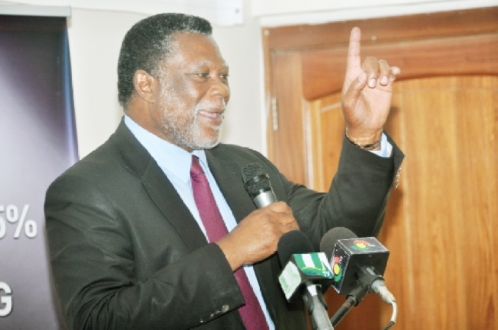The Energy Commission has sworn in 120 Energy Managers, to plan and execute strategies that would minimise the energy consumption of public institutions to save the national purse and the environment from depletion.
The Chairman of the Commission, Dr Kwame Ampofo, tasked the officers to influence the attitudes of their colleagues to adopt a culture of energy conservation and their managements to invest in energy efficient appliances.
[contextly_sidebar id=”fQxQWk9UBkcvEBUsvTV5rZqeCvAWvPR1″]Dr Ampofo said an energy audit conducted among 19 of the 25 Ministries in April indicated that there was a huge potential for reducing energy consumption and thus making savings from public institutions whose energy bills were footed by the State.
He explained: “The audit focussed on three major appliances: air-conditioners, lighting and refrigerators. Air conditioners remain the top consumer of electricity in our offices.
“They consume, averagely, 8,323,514.98kWh per annum, which translates into GH₡ 4,910,873.84 per annum as payable bills. Lighting is the second highest consumer followed by refrigerators. These three combine to consume in excess of nine million kWh translating into GH₡ 5.5million per annum.”
Dr Ampofo said the audit was conducted following requests by some public institutions for advice on energy savings, in reaction to the President’s directive that state-owned institutions be fitted with prepaid metres to pay their bills directly.
To assist the institutions, Dr Ampofo also launched the “Cut and Save Energy Campaign” for Ministries, Departments, Agencies and local government institutions.
The United Nations Development Programme (UNDP), Dutch and Co, a professional energy efficiency service provider, and Philips, are supporting the campaign.
The climax of this programme, Dr Ampofo said, would be the launch of a ‘Challenge Fund’ next year, as part of the Millennium Development Agency facility, with institutions, through their Energy Managers, having the opportunity of accessing the fund, from up to 50 per cent of their retrofit implementation cost, to implement energy efficiency retrofits.
He, therefore, urged Metropolitan, Municipal and District Assemblies to respond to the request to nominate energy managers to be trained in the regions from October 4.
Nana Asare Afriyie, the Executive Director of the Energy Foundation, said the cheapest way to make savings on energy was in managing both supply and demand because it was unwise to increase supply only to waste it.
The initial investment in energy efficient infrastructure and appliances, he said, was relatively higher, he said, but were always cost effective.
He said the campaign was thus not aimed at denying institutions the use of requisite energy appliances but to encourage them to use these wisely, and thus urged the heads of institutions to back their energy managers, whom they nominated themselves, to succeed.
He explained that the national campaign to switch from the use of incandescent bulbs to CFC bulbs between 2006 and 2007 saved Ghana between 200,000 megawatts and 220,000 megawatts – which is equivalent to the capacity of the Asogli Power Plant.
Mr Kofi Agyarko, the Director of Technical Regulations, of the Energy Commission, therefore, expressed surprise that one Ministry is still using incandescent bulbs, which had since been outlawed.
He recommended the replacement of the CFC bulbs with LED ones, saying they would reduce the consumption by lighting by more than half.
Mr Agyarko said the walk through energy audit in the Ministries revealed some anti energy conservation practices, which included leaving doors ajar, or louvre blades opened even when airconditioners were turned on, using of light fabrics as curtains in rooms with air conditioners, keeping fridges with nothing in them switched on, even through weekends.
He said airconditioners worked efficiently in enclosed environments, therefore, having double glazed glass windows was better than using louvre blade windows.
In the purchase of airconditioners, lights and fridges, he said, institutions were obliged by law to always purchase star-rated ones, with those with more stars being more efficient.
Mr Paolo Dalla Stella, a systems analyst with UNDP and Mr Herbert Friese, the General Manager of Dutch and Co, pledged their organisations continued support.
–
Source: GNA


